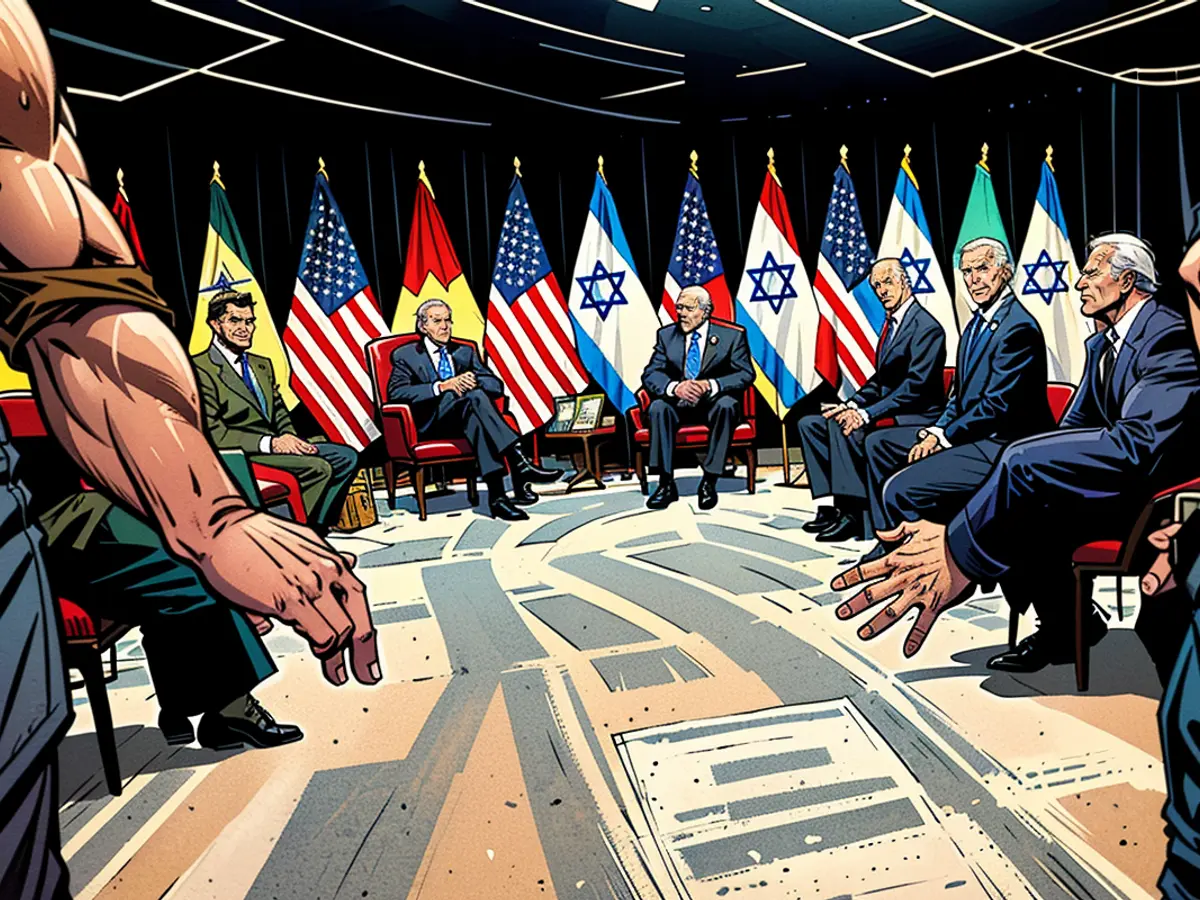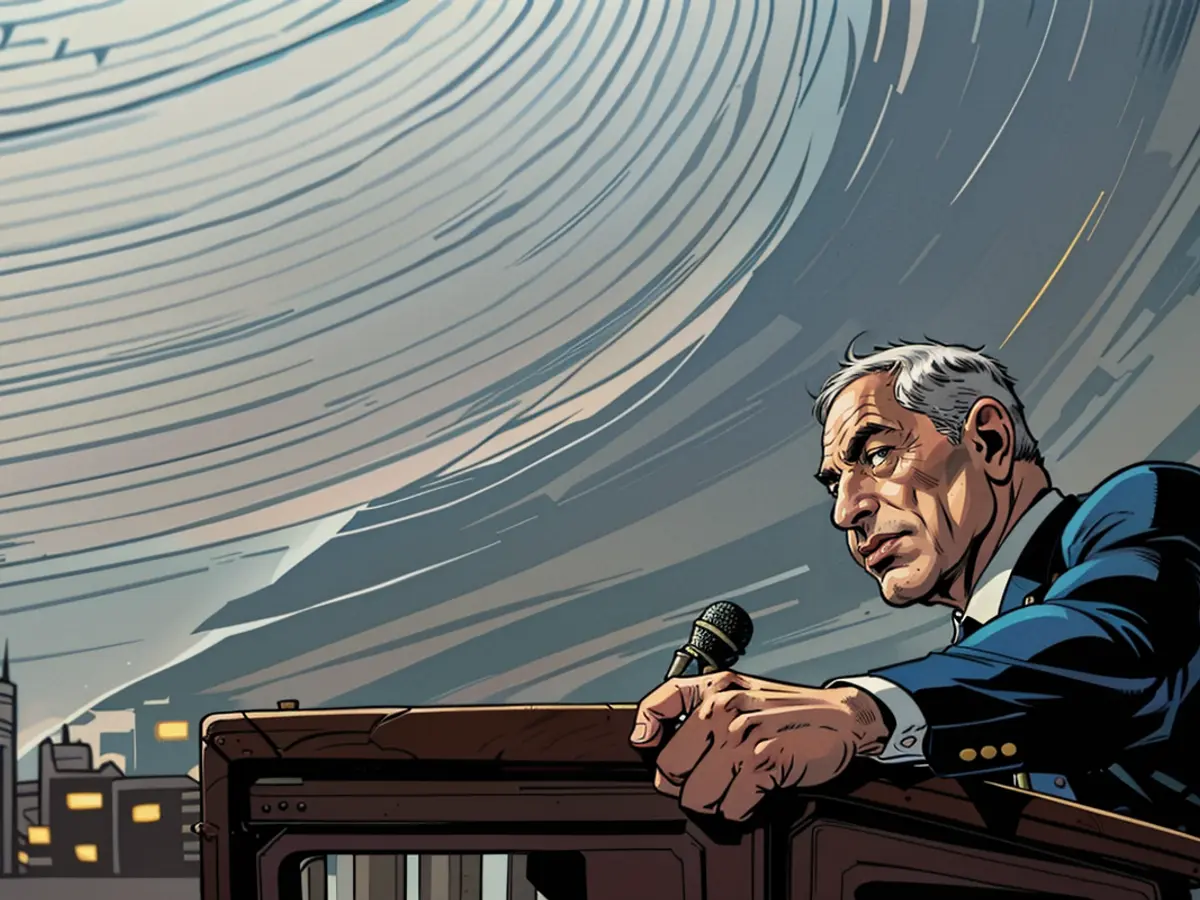Netanyahu’s visit to the US could be crucial to a ceasefire deal. But does he want one?
His highly-anticipated visit – chock-full of meetings with top US officials and a prized address to Congress – will now undoubtedly be overshadowed by US President Joe Biden’s stunning decision to drop out of the presidential race. But as detailed ceasefire negotiations aimed at turning a framework agreement into a final deal stretch into their third week, Netanyahu’s visit will still be critical to the prospects of a ceasefire in Gaza.
Senior US officials say a deal is within reach, but the prospects of a deal may hinge on the answer to one key question: Does Netanyahu actually want a deal?
The conventional wisdom in Israeli media, politics and on the streets of Tel Aviv would tell you that the answer to that question is no – that Netanyahu has much more to gain by prolonging the war and much more to lose by ending it.
The war has allowed Netanyahu to delay his share of accountability for the failures leading up to the October 7 attacks, rebuffing calls for new elections with stiff wartime resolve. His party’s prospects in the next election have actually improved in recent months. And the right-wing coalition partners keeping him in power have threatened to bolt if Netanyahu cuts a deal that ends the war.
Even Biden has said “there is every reason” for people to believe Netanyahu is prolonging the war in Gaza in order to stay in power.
There are also indications that Netanyahu is throwing up eleventh-hour obstacles to reaching a deal. He reneged on a key Israeli concession regarding allowing Palestinians unrestricted access to northern Gaza that was included in Israel’s latest ceasefire proposal and now appears to be insisting on Israel maintaining control of the Philadelphi Corridor, a 14km strip of land that serves as a buffer zone on the border between Egypt and Gaza. And publicly, his rhetoric has undermined confidence in Israel’s commitment to reaching a deal that could end the war.
And yet, Netanyahu and his negotiating team have also steadily engaged in negotiations, exchanging proposals with Hamas and bringing the two sides closer than ever to a potential deal. A growing share of the Israeli public, led by hostage families, is demanding the government strike a deal. And Netanyahu’s allies insist he is earnest in his desire to strike a hostage release deal – just the right deal, one that could allow Israel to resume fighting in Gaza.

That tension will be inescapable as Netanyahu heads to Washington, where he has often sought to bolster Israel’s standing in the US as well as his own political standing at home.
While Netanyahu will look to showcase the support he still has in Washington (and a standing ovation from a majority of lawmakers in Congress should do the trick), his visit will also be an opportunity for top US officials and lawmakers to push, prod, nudge and cajole him toward a deal – in both public and private.
Chief among those eager to make that case will be the US president, who will meet face-to-face with Netanyahu this week for the first time since Biden flew to Israel in October in a dramatic show of wartime support.
The warmth and sympathy that filled the air during that October visit is likely to be replaced by something much frostier.
Biden has grown steadily more critical of Israel’s war in Gaza – where more than 39,000 Palestinians have been killed, according to the Palestinian Ministry of Health – and Netanyahu has resisted US pressure, often publicly thumbing his nose at the White House.
Even as he has maintained strong support for Israel, Biden became the first president since Ronald Reagan to withhold some US munitions to Israel – suspending shipments of 2,000-pound bombs in May amid concerns about civilian casualties in Gaza.
Netanyahu, meanwhile, has not only resisted US calls to rein in Israeli military operations in Gaza, but has used his defiance of the White House’s calls for restraint to bolster his political standing in Israel – including in a speech just days before his trip to the US in which he talked up his refusal to bow to Biden’s pressure to wind down the war and abandon a planned offensive in Rafah.
Biden’s decision to drop out of the presidential race just two days before he sits down with Netanyahu will unquestionably shift the dynamic between the two men even further – exactly how remains to be seen.
Netanyahu will be the first foreign leader to sit down with the now effectively lame duck president – albeit one who still has six months in office during which he will continue to steer US foreign policy.

Loosened from the constraints of electoral politics and with a keener eye on his legacy, how will Biden now approach Netanyahu, the future of the war in Gaza and US policy toward Israel? And to what extent will Netanyahu feel compelled to heed Biden’s pressure?
As the Israeli prime minister weighs that new dynamic, Netanyahu – a keen observer of US politics – may be looking to someone else as he decides whether to take a leap toward a ceasefire: former US President Donald Trump.
Trump has a track record of unflinching support for Israel and has been critical of Biden’s efforts to rein in Israel’s conduct in Gaza. During his speech at the Republican National Convention, he warned that the hostages “better be back before I assume office, or you will be paying a very big price.”
But Trump in April also urged Israel to get its war in Gaza “over with, and get it over with fast.”
And Netanyahu no longer enjoys the cozy relationship he once had with Trump.
“The first person to congratulate Biden was Bibi (Netanyahu). And not only did he congratulate him, he did it on tape,” Trump told CNN analyst Barak Ravid in 2021. “He was very early — like, earlier than most. I haven’t spoken to him since. F**k him.”
Netanyahu will have plenty of opportunities to assess whether that sentiment still stands as he meets with Trump allies in Washington this week. There are currently no known plans for him to meet with Trump.
Despite the US President Joe Biden's decision to drop out of the presidential race, the middle east situation remains volatile. Senior US officials believe a deal to end the conflict in Gaza is within reach, but the willingness of Israeli Prime Minister Netanyahu to negotiate is uncertain.
Netanyahu's actions, such as reneging on ceasefire agreements and insisting on maintaining control of the Philadelphi Corridor, have raised concerns that he is prolonging the conflict to preserve his political power. However, he has also engaged in negotiations with Hamas and has public support for a ceasefire from a growing segment of the Israeli population.







